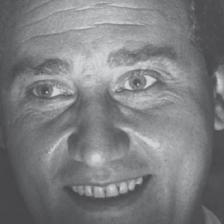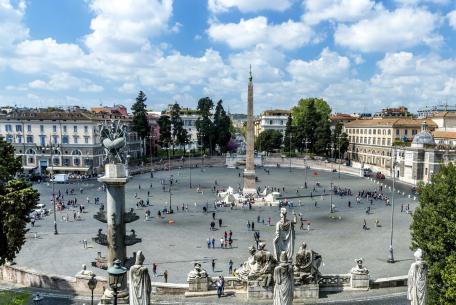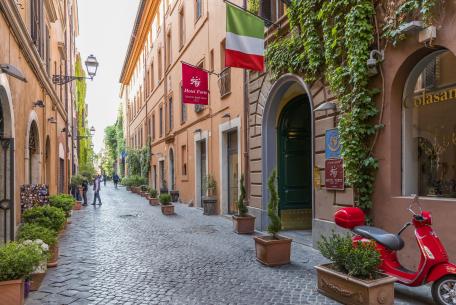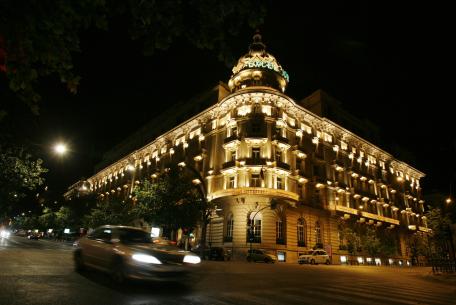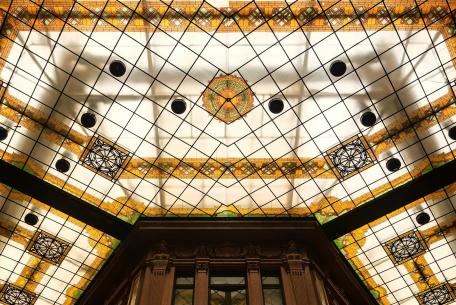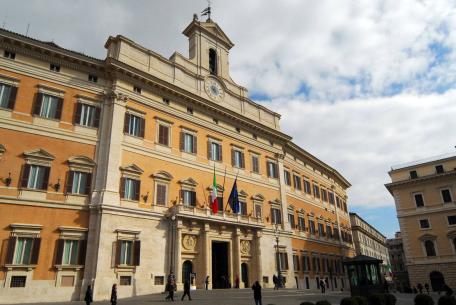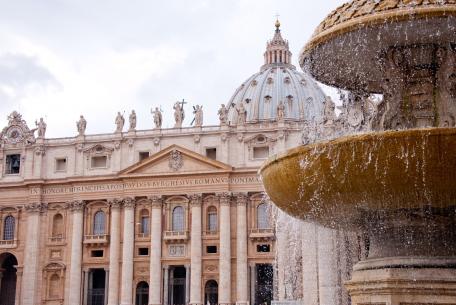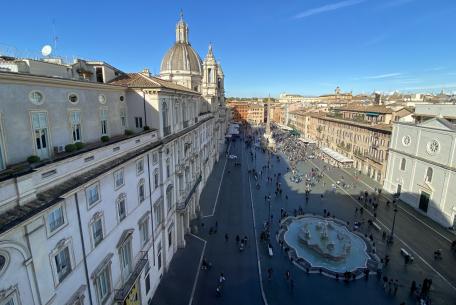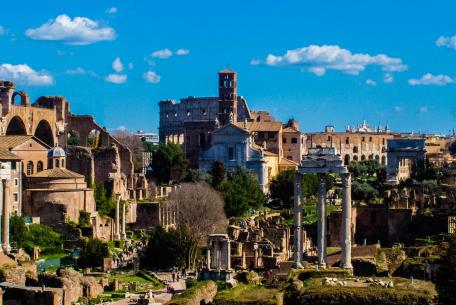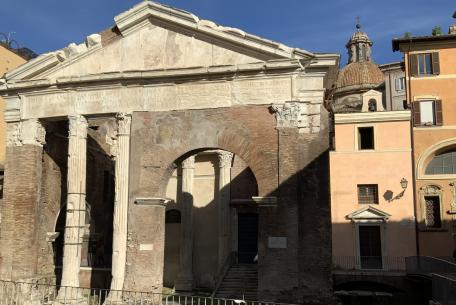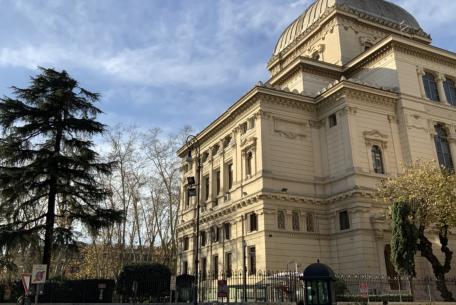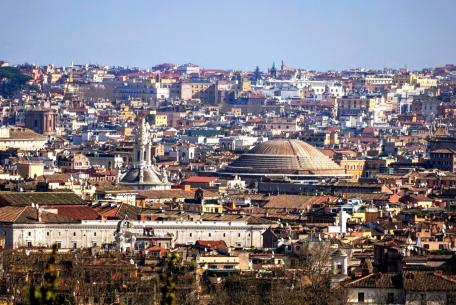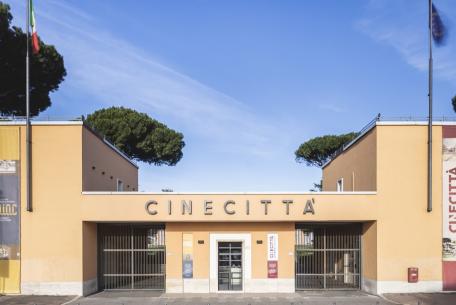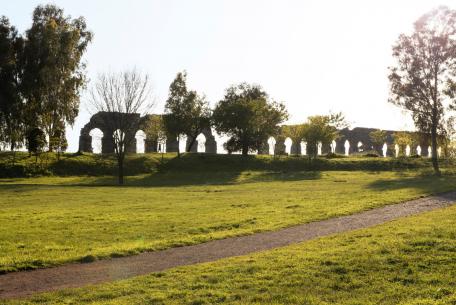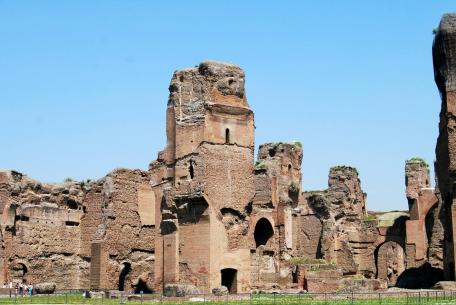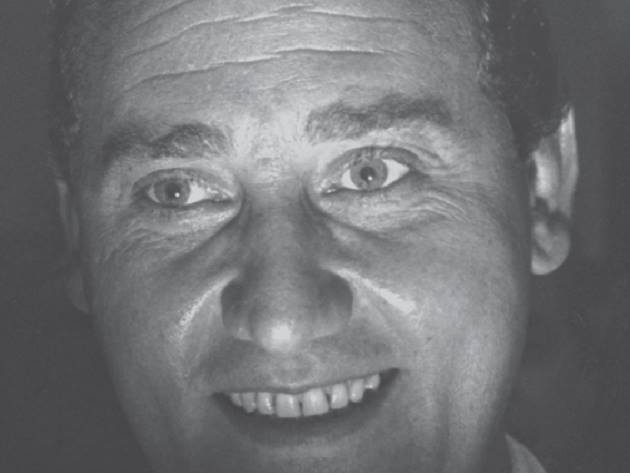
Alberto Sordi was born in Rome, in Trastevere, on 15th June 1920. His father Pietro was a member of the orchestra of the Opera House in Rome, his mother Maria was a teacher. The last of four children, he remained close to his family all his life. As a child he already showed a marked aptitude for performing, putting on puppet shows at school and singing in the white voice chorus of the Sistine Chapel.
When he was very young, he worked as an opera singer and recorded a fairy tale record for children. His passion for acting pushed him to abandon his studies as an accountant to attend the Accademia dei Filodrammatici in Milan.To his great disappointment, his Romanesque inflection was not appreciated by the teachers. He came back to Rome and tenaciously continued to pursue his dream. After an attempt with comedy theatre, he worked as supporting actor in Cinecittà. In 1937 he was chosen by Metro Goldwyn Mayer as a voice actor for Oliver Hardy and joined the company of Aldo Fabrizi attempting to perform in Avanspettacolo. In 1940 he was called to join the Royal Army and managed to serve in the musical band. This gave him enough free time to continue working in the show world. Versatile artist, he also ventured into radio, achieving success in 1948 with a program of his own: This is Alberto Sordi speaking. Nonetheless, cinema was still his dream. After various films he finally received his first significative reward. He won the Silver Ribbon as best supporting actor for his role in the film I vitelloni by his friend Fellini, while continuing to successfully perform at the theatre together with Wanda Osiris.
Sordi, conquered the great audience with Un americano a Roma (1954) and in the following years played in the role of tragicomic characters perfectly personifying the “the average Italian man”, coward and conformist, mainly dealing with his own interests. A highly versatile actor, he excelled playing dramatic roles as in La grande guerra by Mario Monicelli (1959). He worked with the most famous actors, such as De Sica, De Filippo, Risi, and Vitti. He directed 19 films and participated in 190 more. National and international institutions, critics, and the audience awarded him with innumerable prizes and honours such as 4 Silver Ribbons, a Silver Bear in Berlin in 1972, a Golden Lion for Lifetime Achievement in 1995 and a David di Donatello for Lifetime Achievement in 1999.
Loved for his communication skills and affectionately called Albertone nazionale, he deeply knew the power of the media. Famous and surrounded by innumerable friends and admirers, Sordi was a very reserved person in private life, dedicated to his family, deeply faithful and philanthropist. During his last years, very few people were allowed to visit him in his splendid villa in Via Druso, where he died on 24th February 2003. His body was exhibited in Campidoglio and received the homage of the common people and his friends for two days. He was then buried in the Monumental Cemetery of Verano.
Download here the full itinerary
The locations in Roma
Piazza del Popolo
Nell’anno del Signore, Luigi Magni (1969)
The two Carbonari Targhini (Renaud Verley) and Montanari (Robert Hossein), are led to the scaffold in Piazza del Popolo (rebuilt in De Laurentis studios). The monk (Alberto Sordi) tries, without success, to save them from the guillotine. A plaque on the facade of the building in front of the Basilica of Santa Maria del Popolo still commemorates the death of the two young men.
Ponte Regina Margherita
Il medico della mutua, Luigi Zampa (1968)
The funeral procession accompanying Doctor Bui, parades along the bridge that connects Piazza della Libertà to Lungotevere Arnaldo da Brescia. At its head is the ambitious GuidoTerzilli (Alberto Sordi), who dreams of “inheriting” the thousands of patients of the deceased.
Via Margutta
Il tassinaro (1983)
The Roman taxi driver Pietro Marchetti (Alberto Sordi) reaches via Margutta, one of the three characteristic streets of the Tridente in Rione Campo Marzio, to pick up a customer. To his great surprise the customer is Federico Fellini, playing in the role of himself, who lived in via Margutta n. 110 in the real life.
Via Vittorio Veneto
Il Conte Max, Giorgio Bianchi (1957)
The Dolce Vita (ndt. Sweet Life) is exploding. Alberto Boccetti’s (Alberto Sordi) newsstand is in Via Veneto, symbol and centre of this sparkling period. He dreams of leading the same elegant life as his wealthy customers. So, he tries to obtain useful suggestions from count Max Orsini Varaldo (Vittorio De Sica). New adventures will arise from their friendship…
Galleria Alberto Sordi
Polvere di stelle (1973)
It is 1943 and Rome is occupied by Nazi troops. Every day, Mimmo Adami (Alberto Sordi) and his wife Dea Dani (Monica Vitti), hoping to be noticed, to obtain a contract in show business and to become famous, dress up and walk along Colonna Gallery, a meeting place for actors and artists. The gallery was reopened after a careful restoration and named after Alberto Sordi in 2003.
Piazza di Monte Citorio
Il tassinaro (1983)
The taxi driver Pietro Marchetti (Alberto Sordi) ends his journey leading the well-known Italian politician Giulio Andreotti, playing in the role of himself, in this square where Palazzo di Montecitorio houses the Chamber of Deputies of the Italian Republic.
Piazza Cavour
Il commissario, Luigi Comencini (1962)
Frustrated and disappointed to have lost his job despite his dedication, Commissioner Lombardozzi (Alberto Sordi), badly dressed and tired, reads a newspaper sitting on a bench in front of the Palace of Justice, that the Romans call “Palazzaccio”. Marisa (FrancaTamantini) will save him ...
Tutti dentro (1984)
The film opens with an overview that goes from Saint Peter’s Dome to “Palazzaccio”, symbol of the inflexibility of the judge Annibale Salvemini (Alberto Sordi).
Piazza Navona
Il tassinaro (1983)
The actress Silvana Pampanini, playing in the role of herself, is waiting for the taxi near Palazzo Pamphilj.The driver Pietro (Alberto Sordi) mistakes her for another famous actress, Sylva Koscina.
Piazza della Bocca della Verità
Il Marchese del Grillo, Mario Monicelli (1981)
Capital executions take place in the splendid square, rebuilt in the studios for the shooting of the film. Here the marquis (Alberto Sordi) is shocked to witness the beheading of his friend Don Bastiano (Flavio Bucci), sentenced for heresy.
Piazza del Grillo - Casa dei Cavalieri di Rodi
Il Marchese del Grillo, Mario Monicelli (1981)
Mario Monicelli chooses the beautiful arcade of the Knights of Rhode’s House to set the external scenes of the house of marquis Onofrio del Grillo (Alberto Sordi). While Onofrio and his mother (Isabelle Linnartz) discuss the corruption of morality in the contemporary world and reprimand the poor Genuflessa (Elena Daskowa Valenzano), Onofrio’s cousin, the camera frames the splendid arcade of the building and its views of the Imperial Fora and Palazzo Venezia.
Via del Portico di Ottavia
Un americano a Roma, Steno (1954)
After skirting the Oratory of Sant’Andrea dei pescivendoli, the young Nando Mericoni (Alberto Sordi), meets the “Gattomammone”, a poor feline believed to be the embodiment of evil. Fascinated by the American myth, the protagonist stages a fake attack on the animal, then hides behind the columns of Portico di Ottavia.
Via Sant’Angelo in Pescheria
Il Marchese del Grillo, Mario Monicelli (1981)
In this street, in the heart of the Jewish Ghetto, the exhilarating joke organized by the marquis takes place. An incredulous craftsman finds a wall used as a public urinal instead of the entrance of his workshop. We are in Via Sant’Angelo in Pescheria, though the street is identified as Via dei Banchi Vecchi in the film.
Complesso monumentale di San Michele a Ripa Grande
Una vita difficile, Dino Risi (1961)
Today the seat of several MIBACT offices, this building was once a prison. This is where Silvio Magnozzi (Alberto Sordi) is serving a sentence of two and a half years for the riots that occurred as a result of the attack on Togliatti in 1948.
Terrazza del Gianicolo
Polvere di stelle (1973)
The film opens with a splendid panoramic view, taken from the Janiculum Terrace. A soldier is observing the city from the top of the hill, the viewer’s gaze reaches the most beautiful and evocative places in Rome.
Piazzale Ugo La Malfa - Monumento a Giuseppe Mazzini
First aid – Pronto Soccorso, episode of the film I nuovi mostri, Mario Monicelli, Dino Risi, Ettore Scola (1977)
While driving through Rome with his “traveling lounge”, an old-fashioned Rolls-Royce, the aristocrat Giovan Maria Catalan Belmonte (Alberto Sordi) rescues a man run over by a car, in front of the monument to Giuseppe Mazzini, near the Rose Garden. After trying in vain to find hospitalization for the injured in three hospitals, the cynical protagonist takes him back to the starting point, which in the film is identified with the monument to Mussolini.
Cinecittà Studios
Il tassinaro (1983)
At the end of his shift with his cab “Zara 87” Pietro Marchetti (Alberto Sordi) takes Federico Fellini, playing in the role of himself, to Cinecittà Studios, “the world cinematography temple”.
Una vita difficile, Dino Risi (1961)
Silvio Magnozzi (Alberto Sordi) does not accept his life as an ordinary employee. He goes to Cinecittà Studios hoping to realize his dream. Here he tries to propose his subject to famous directors and actors such as Alessandro Blasetti, Silvana Mangano, and Vittorio Gassman (all playing in the role of themselves), who snub him.
Parco degli Acquedotti
Il Marchese del Grillo, Mario Monicelli (1981)
During a carriage ride with his French friend, captain Blanchard (Marc Porel), Onofrio del Grillo (Alberto Sordi) shows him the pope in all his splendour. The two characters run along the imposing structures of Claudio Aqueduct.
Bravissimo, Luigi Filippo D’Amico (1955)
Ubaldo Impallato (Alberto Sordi) is a music teacher who teaches precariously in the schools of the Roman suburbs. He holds one of his lessons right in the Aqueduct Park, where, in addition to showing the students the vestiges of the ancient world near Claudio Aqueduct, he takes advantage to have children collect some vegetables for a meal.
The locations on Roma's coast
Fregene, Parco Federico Fellini
Lo sceicco bianco, Federico Fellini (1952)
Wanda (Brunella Bovo) finally meets his idol “the white sheikh” (Alberto Sordi) in the pine wood in Fregene while he is swinging on a swing, immersed in the light that filters through the trees. In 2009 the pine wood was named after Federico Fellini, in memory of this scene and of the director’s deep bond with the seaside city.
Ostia Antica, Piazza della Rocca
Il tassinaro (1983)
Here, it is possible to admire the building used as the house of Pietro Marchetti (Alberto Sordi) in the wonderful village’s main square, to the left of Sant’Aurea’s basilica.
Ostia
I vitelloni, Federico Fellini (1953)
The five friends, around whose stories the plot of the film develops, meet at the bar to laze around. The place was located along Via Lucio Coilio, in Ostia.
Ostia, Lungomare Lutazio Catulo
I vitelloni, Federico Fellini (1953)
he film opens with the last event of the summer, the election of Miss Mermaid 1953. The party is hosted in a kursaal along the Roman coast.
Alberto Sordi's houses
Via di San Cosimato
Alberto Sordi was born on 15th June 1920, at number 7 of this street that connects Piazza di San Cosimato with Piazza di Santa Maria in Trastevere, in the heart of the district, in a small house that no longer exists. It was demolished to build new buildings. On the opposite building facade, a plaque commemorates the great actor, “an unforgettable interpreter of the Italians’ stories”.
Via Druso, 45
The large villa that Alberto Sordi purchased in 1958, snatching it away from Vittorio De Sica, overlooks Piazzale Numa Pompilio, in front of the Baths of Caracalla. Designed by Clemente Busiri Vici, it is surrounded by greenery and it was declared site of cultural interest thanks to the archaeological walk and all the art objects it contains. The villa, which will soon become a museum, hosts numerous cultural events. It is open for special occasions like for example the centenary of the artist’s birth. Reservation is required (info: fondazionemuseoalbertosordi.org).
 Condividi
Condividi













































